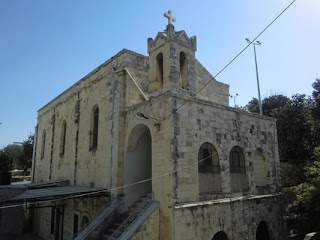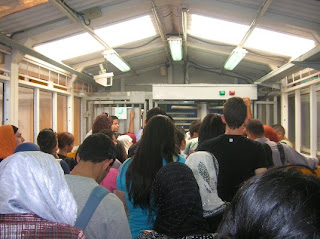 |
| Rula and Sami |
Earlier this autumn we met with Father Ibrahim, the minister of the Anglican Church in Nablus. He says that the western media wants to suggest that there is a conflict between Muslims and Christians and that this is the reason for the Christians’ exodus. Father Ibrahim renounces this strongly and claims that it is the Israeli occupation and its consequences that are the main reasons for people giving up and moving to the USA or to countries in Europe, where as Christians they can relatively easily integrated.
 |
| Father Ibrahim |
- The reality here is that it is the Israeli occupation and not Islam that is the reason for the Christians leaving Nablus, he says. - We speak the same language, we live in the same culture and we have built strong ties with the Muslims. We do not have any religious problems, he continues. He passionately dislikes the fact that the Christians are leaving the town and is working hard to persuade them to stay in Nablus.
- We are Christians, he tells them, - and this is the holy land. We are needed here and the occupation will not last forever. He thinks that those who choose to leave believe that it is “greener on the other side of the fence”. – I tell them that if they leave they must not think that they are moving to paradise, but that they should build their own paradise here, says Father Ibrahim. However, he does not conceal that he, as a Christian, feels isolated in Nablus. In addition to all the checkpoints surrounding Nablus there are also many problems related to the Israeli settlers in the area between Nablus and Ramallah, and most of the NGO’s working in Palestine do not care so much about the relatively small Christian community in Nablus, but are working more in big towns like Jerusalem, Bethlehem, Ramallah and Nazareth.
The Khalil family is not thinking of leaving Rafidia. They only moved here a year ago. Rula is from Haifa, while Sami’s family has lived in Nablus for 800 years! Sami and Rula used to live in a Christian community within an Arab village close to Haifa for ten years. Then they decided to move to Rafidia, where Sami’s extensive family is living. They have 3 sons, the oldest is 9 year old, the younger are twins. – We moved here mainly because we want our children to grow up in a less stressful environment, says Sami. – We live a much simpler life here. In Haifa everything is much more expensive. Here I have 30% less salary than in Haifa and still I have more than enough, he continues.
 |
| Rafidia |
Rula worked as an occupational therapist for several years in Haifa and with this work experience it would not at all be that difficult to get a job in Nablus. However, as an occupational therapist working in a mainly Moslem culture, she would feel uncertain about what she can do. – Can I shake this man’s hand? Can I speak to this boy in this way? Can I touch this child? I have to learn the cultural codes so that I do not transgress anyone’s boundaries, she says.
Rula and Sami confirm what Father Ibrahim already told us - that there are no conflicts between the Christians and the Muslims in Nablus. It is unemployment and economic insecurity that lead to many Christians emigrating. - In addition to this, it is very difficult for men in Nablus to find a wife within his own community. Besides Christian parents in general are reluctant to send their daughters here, Christians being in such a minority, says Sami, - so many men are leaving Nablus for this reason also.
 |
| St Philips Church and neighbouring mosque in Nablus |




















































